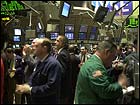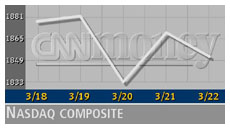
NEW YORK (CNN/Money) -
Stocks declined Friday, with weakness in technology adding to the general trend of a down week that saw the Dow Jones industrial average snap its five-week winning streak.
The Nasdaq composite also drifted lower as stocks were locked in a fairly slim trading range.
The Dow Jones industrial average lost 179 points, or 1.70 percent, to close the week at 10,427.67. The Nasdaq composite lost 17 points, or just under 1 percent, to end the week at 1,851.39. The Standard & Poor's 500 index gave back 17 points, or 1.5 percent, to close the week at 1,148.70, virtually erasing all of its gains for the year.
"We're at the end of the quarter and people are consolidating a little bit," Ned Riley, chief investment strategist at State Street Global Advisors, told CNNfn's Street Sweep. "April could look better if we can see some tech names assert leadership."

Trade was uneven throughout the week, with the first half dominated by concerns about the Federal Reserve and the second half dominated by company-specific news.
On Tuesday, the Federal Reserve opted to keep the overnight bank lending rate steady at 1.75 percent but changed its bias to a neutral stance, saying that the risks of economic weakness and inflation were evenly balanced. The news was taken as the first step towards a rate-raising campaign, which some analysts said could start as early as May or June.
Investors took in a few positive tech announcements released late Thursday. No. 1 chip equipment maker Applied Materials (AMAT: down $0.49 to $51.53, Research, Estimates) said that it would split its stock 2-for-1 and that it saw the semiconductor industry finally recovering.
J.P. Morgan led the list of brokerage firms upgrading handheld device maker Palm (PALM: up $0.69 to $3.86, Research, Estimates), which posted a smaller-than-expected loss in its fiscal third quarter and reaffirmed its targets for the current quarter's revenue. The company also said it sees the handheld device market experiencing double-digit growth in 2002.
But in a memo first obtained by Dow Jones Newswires, the head of Hewlett-Packard's services unit said revenue and profit for the current quarter are below forecast so far. The memo to the HP (HWP: down $0.35 to $18.15, Research, Estimates) unit's managers was sent Monday, the day before the company's shareholders voted on the controversial acquisition of PC-making rival Compaq Computer (CPQ: down $0.12 to $10.65, Research, Estimates). While HP management has claimed victory, the vote has yet to be officially certified.
"HP's problems with services are not uncommon. IBM has had issues like that, too, of late," said Arnie Berman, managing director and technology strategist at SoundView Technology Group. "The larger problem with tech today [Friday] and in the last month has been that improvement in semiconductor capital equipment, like Applied Materials, doesn't transfer over to the rest of the tech sector. While tech fundamentals are turning, the evidence of that has been slow coming."
With the fourth-quarter reporting season just about over, the focus next week will turn to economic news.
"It's been a very quiet and erratic week. You've got a couple of slow weeks coming up, so we may be in this range for a while," Mike Murphy, head of equity trading at Wachovia Securities, told CNNfn's Street Sweep.
Looking forward on the corporate front, first-quarter results are primed to show improvement. According to earnings tracker First Call, profit warnings for the first quarter are down 20 percent from each of the previous four quarters. "Earnings are bottoming out and will almost certainly turn up in the next quarter," Chuck Hill, director of research at First Call, told CNNfn.
In global trade, European markets were higher by the close, while Asian markets closed mixed. The dollar was stronger against the yen and the euro. Light crude oil fell 33 cents to $25.35 a barrel in New York. Gold prices rose $4.50 an ounce in Chicago.
Treasurys closed lower, pushing the 10-year note yield up to 5.39 percent.
Market breadth was negative. On the New York Stock Exchange, losers beat winners by more than 9-to-7 as 1.23 billion shares changed hands. On the Nasdaq, decliners beat advancers 4-to-3 as 1.49 billion shares traded.
HP, Palm among most actives
The Hewlett-Packard news balanced out gains in the broader tech market, while investors seemed to shrug off a warning from McDonald's.
Weakness in Lockheed Martin (LMT: down $1.40 to $56.25, Research, Estimates) had an impact on Dow component Boeing (BA: down $1.28 to $46.39, Research, Estimates) and the aerospace sector overall after a report said the Navy and Marine Corps are considering a preliminary budget plan that could cut their purchase of the Joint Strike Fighter -- that Lockheed is building -- by 30 percent. Other Dow losers included Microsoft (MSFT: down $0.91 to $60.45, Research, Estimates), IBM (IBM: down $1.18 to $105.60, Research, Estimates) and 3M (MMM: down $1.91 to $116.39, Research, Estimates).

Fast-food chain McDonald's (MCD: down $1.05 to $27.65, Research, Estimates) warned that first-quarter profit would be 29 cents to 30 cents a share, which would miss current estimates for a profit of 31 cents a share.
Goldman Sachs raised its 2003 earnings-per-share forecast for Dow component American Express (AXP: up $0.08 to $41.10, Research, Estimates), citing the shares as being particularly attractive for investors looking for stocks that will participate strongly in the economic recovery. Other Dow stocks adding strength included Eastman Kodak (EK: up $0.46 to $32.09, Research, Estimates), Caterpillar (CAT: up $0.03 to $57.13, Research, Estimates) and Coca-Cola (KO: up $0.85 to $51.25, Research, Estimates).
"It's very quiet today [Friday]. There's not a lot out there that's too negative or positive," said Jack Baker, head of equities at Putnam Lovell Securities. "There's just no short-term compelling reason to buy stocks now. We're waiting for the upcoming earnings reporting period."
Among other stocks making news:
Chipmaker Micron Technology (MU: down $0.61 to $33.90, Research, Estimates) reported a loss of 5 cents a share late Thursday, a penny worse than expected but a narrower loss than the one reported the same period one year earlier.
Sprint (FON: down $0.24 to $15.31, Research, Estimates) said its chief financial officer will retire in June after 31 years with the company.
3Com (COMS: unchanged at $5.44, Research, Estimates), the former parent of Palm, posted a narrower third-quarter loss of 12 cents a share, versus a loss of 36 cents a share a year earlier. Analysts were expecting a loss of 16 cents per share.
Deutsche Banc Alex. Brown reiterated its "buy" rating on Cisco Systems (CSCO: up $0.08 to $16.57, Research, Estimates), saying that a mid-quarter status check shows the network equipment maker's enterprise momentum has picked up in the last couple of weeks and that the company is well positioned to recover.
Orthopedic device maker Biomet (BMET: down $3.93 to $27.53, Research, Estimates) was unusually active, hurting the Nasdaq. J.P. Morgan was among the brokerage houses cutting its rating after the company reported a fiscal third-quarter profit of 23 cents a share, a penny short of expectations but a little stronger than results from the same period one year earlier.
Shares of athletic apparel maker Nike (NKE: down $3.70 to $59.50, Research, Estimates) were hit hard after the company said that, despite a solid quarter, it is still short of its long-term financial goal of producing and maintaining an earnings-per-share growth percentage in the mid teens. Nike reported better-than-expected results late Thursday that were stronger than the period one year earlier, but analysts said global sales were not as strong as some had expected.
Travelers Property Casualty (TAP.A: up $1.06 to $19.56, Research, Estimates), the year's biggest initial public offering, gained as much as 6.8 percent on the New York Stock Exchange Friday.

|

